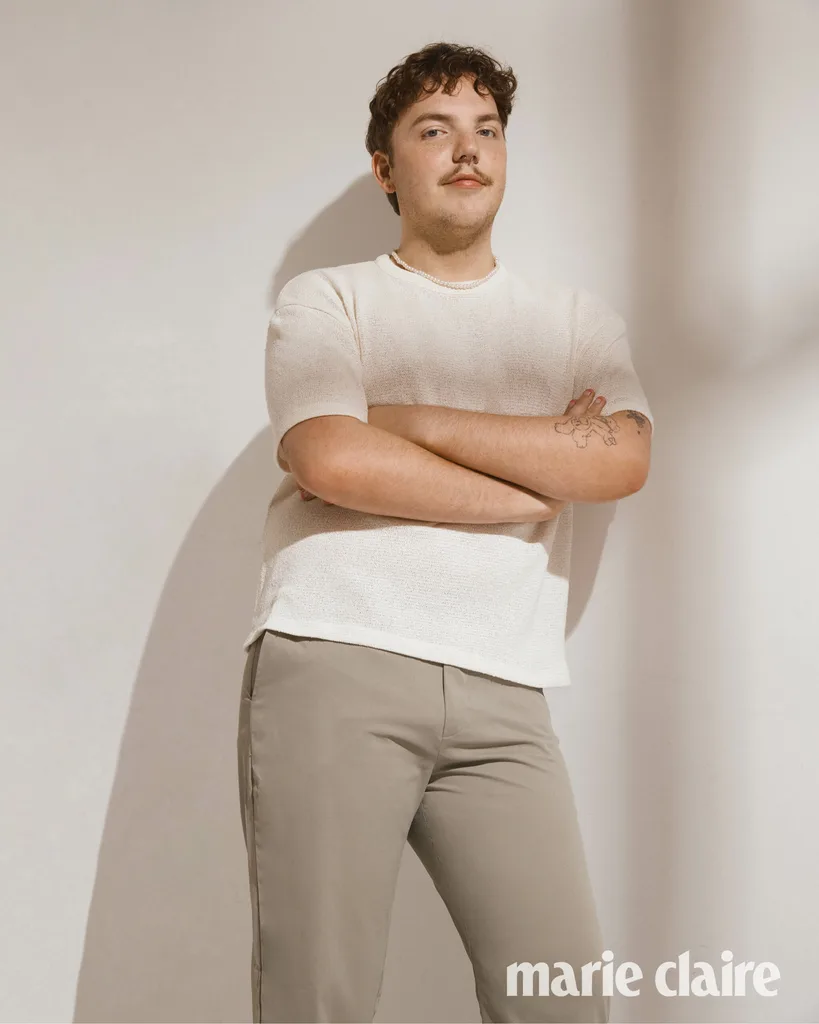It’s a sex crime in four states, yet only 15 per cent of Australians know what stealthing is. Here, consent advocate Chanel Contos writes for marie claire about the complexities of this unique form of sexual violence, and four people who have experienced stealthing share their stories to help fight for change.
I speak to survivors of sexual violence. A lot. When I do, I learn about the intricacies of their experiences. I appreciate every single conversation, as it adds to this web of stories that paints a picture of the rape culture in our country – the culture where we have normalised violence.
What is rare, but I appreciate all the same, is when I get to speak to people who have perpetrated violence and are willing to admit it, in an attempt to stop others from doing so. There is no better way to unpick that web than to understand how each part has been woven by speaking to the people who made it.
A man in his late twenties messaged me on Instagram, admitting that from viewing my stories on stealthing he realised he had raped someone. Stealthing is the non-consensual removal of a condom during sex or the failure to put one on when having previously agreed to. Consenting to sex with a condom, and consenting to sex without a condom, are two drastically different things.
Aside from the obvious risks of not using a condom, such as increased risks of STI transmission or unwanted pregnancy, there are physiological effects as a result of having your bodily autonomy disregarded. This is especially true if you are left ill-equipped to describe what happened, and why it made you feel the way you do.
It’s difficult to measure how many people have been victims of stealthing, as stealthing often occurs without the victim’s knowledge. One study conducted at a sexual health clinic in Melbourne found one in three women and one in five men had been stealthed, however this data represents a small, specific section of the population, because if you were stealthed, a sexual health check would be the first point of action.
Stealthing is a very intricate form of sexual violence because, by definition, in order for you to be stealthed, you must have consented to having protected sex with the person. This means it’s likely you have positive, perhaps loving feelings towards the perpetrator.
This intimate relationship with the perpetrator heightens all of the barriers to understanding, reporting and feeling validated in experiences of sexual violence that we know too well: victim blaming, self-doubt and community judgement. Inconsistent national laws and scarce education on this topic also increase the ambiguity that so many survivors of sexual violence struggle with.
This is a story I received over Instagram. When he was 19, this man was drinking with friends on a holiday down the coast and slept with another girl there. I’m going to put it simply, because it is simple. He couldn’t stay hard. He wanted to have sex and he didn’t want to be embarrassed.
So he took the condom off without consent in order to satisfy his desires. This caused great distress for the victim instantly, but it took the man eight years to realise that he had raped someone. He said he knew it was wrong because it felt wrong, but he didn’t know how wrong. He said he would never have done it if he knew it was a crime.

When he first put on that condom, he did not know that he would be taking it off minutes later. But when he had the urge to do it in the moment, he allowed his entitlement to another’s body, his own sexual desires and pride to outweigh his respect of another’s health, choices and bodily autonomy. That means that this decision to rape someone stemmed from two things that have been ingrained in this man his whole life: sexual entitlement and the pressure to be a “man” and “perform” in the bedroom.
I often get asked if a woman lying about being on the pill counts as stealthing. Instead, this is a different act; it’s one of reproductive coercion. Many people who have shared their experiences of stealthing recount that right before it occurred, the perpetrator asked if they were on contraception. This suggests that the reason for stealthing is not to get a partner pregnant but because of sexual desires.
The criminalisation of stealthing is a natural progression after achieving the objectives of the Teach Us Consent campaign, because it is an act of normalised violence. What I mean by this is that it’s a form of rape that is not understood by our society as rape and, because of ingrained male sexual entitlement, it occurs at an unknown scale without accountability.
The good news is that there is potential to stop it en masse. That man did not wake up in the morning and decide to inflict violence on someone. He felt entitled to do so because parts of society told him that he could. It can be eradicated if we make it clear that he cannot and that stealthing is a criminal act. It’s incredible that laws around the country are overtly declaring this rape.
The ACT was the first jurisdiction to criminalise stealthing, in October 2021, following a private member’s bill from ACT opposition leader Elizabeth Lee. Tasmania and NSW followed suit in June 2022. Victoria outlawed stealthing in August, followed by South Australia in November and in December Queensland announced it will pass legislation in 2023 outlawing stealthing. This leaves Western Australia and the Northern Territory.
The point of changing the laws is to set community standards, to reclassify the non-consensual removal of a condom during sex as wrong. A report by Sienna Parrott from The Australia Institute and Dr Brianna Chesser from RMIT found that only 15 per cent of Australians knew what stealthing was. Once it was explained to them, 81 per cent of Australians believed that it should be criminalised in every jurisdiction. For a country that struggles to reach consensus on most issues, this is telling. I thank both these authors; we wouldn’t be here without you.
Language is one of the most powerful tools for shaping culture. Awareness around this deceitful act from media, from conversations with friends, and from the law have the ability to counteract that ingrained male entitlement that spurs too many to take that condom off, or betray their sexual partner by never putting it on.
Stealthing is an act that occurs when entitlement outweighs empathy. Law reform and awareness around this legislation can outweigh entitlement. Given that, I thank every survivor who has chosen to be a part of this campaign. From a conversation with loved ones, to sharing one of the most vulnerable moments of your life with some of the most powerful people in the country, and to the individuals who have told their story and spoken out against stealthing with me in marie claire, thank you.
Elena, 24, Student

I was 20 years old when I experienced stealthing. I’d just met a new partner, and after a couple of dates he performed oral sex on me.
Two days later, I developed STD symptoms. I booked in to get tested and I asked that he do the same. The next time I saw him, I hadn’t received my results yet and when I asked him about his results, he told me he didn’t get tested. Later that night, after I’d had a few drinks, things obviously got a bit heated between us and he started to take my clothes off. I stopped him and said, “I don’t think we should have sex until my results came back.” He replied, “Don’t stress, I’ve got protection. It’ll be OK.” So we agreed to continue having sex. It wasn’t until we were having sex from a position where I couldn’t see him that he told me, “I need to stop or I’ll cum.”
I was confused because I was under the impression that he was using protection like we agreed. I stopped him and saw that he wasn’t wearing a condom. I asked him why he would do that after everything that had happened in the past week. It was clear that he never considered how his decision would impact me. I was numb. I was really scared at how comfortable he was gambling not only his sexual health but my sexual health and wellbeing just for his own perceived entitlement to sexual gratification.
It was terrifying. It was one of the worst feelings I’d ever had. I felt that I couldn’t talk about it to anyone because I didn’t have a word to describe how violated I felt. It wasn’t until two years later that I heard the word stealthing for the first time. I felt an overwhelming sense of relief because it meant that the shame and the violation I had felt was justified and not just something I was making a big deal out of.
In December, I was able to share my insights with Queensland Parliament both as a victim of sexual violence and as a psychology and criminology student. I reiterated the importance of delivering comprehensive sex education to school students, and the role this has on not only protecting victims, but also potentially limiting the likelihood of becoming an abuser.
I believe if men had access to comprehensive sex education from a young age, we could teach them that their perceived entitlement to sexual gratification is not more important than another individual’s right to safety. Given the abhorrent attitudes of some towards rape, I am doubtful that highlighting victim experiences alone is enough to dismantle cultures of sexual violence.
I suggested that we also look to perpetrators who take accountability for their past actions and now denounce sexual violence, to model appropriate behaviour in our community. Collaborating in this way might help shift the paradigm around sexual violence.
Sam, 21, Student

The first time it happened to me, I was 16. I consented to safe sex for myself and it felt like a complete violation of my personal autonomy. At the time, I didn’t understand what stealthing was, but I had a gut feeling that something wasn’t right. It wasn’t until I came across an Instagram post on stealthing that I finally realised what had happened to me. Having the language earlier might not have stopped it, but at least I would have known what had happened.
All the times I’ve been stealthed there’s been a considerable power imbalance. I was seeing this guy who would take the condom off during sex because he said it “feels better”. When you’re naked in bed with someone who’s physically bigger or older than you, which is often the case in queer sexual dynamics, you feel so vulnerable that letting it happen can often feel safer than saying no.
I consented to sex with a condom, then had that choice taken away from me. Homophobia forces queer kids into the closet, so they have nowhere else to turn to except dating apps, and within that there’s a really high level of vulnerability. In one of my past relationships, I told the guy I was seeing that I wanted him to wear a condom. He would tell me, “I’m on PrEP [an HIV preventative drug], it’s all good,” and kept pushing until I would eventually say yes. This happened for six months. Because of the coercion, I suffered from a number of minor health issues, although I’m thankful that I didn’t contract anything permanent.
At school, I was never taught about power imbalances or stealthing. Not equipping kids with the knowledge they need to have healthy and safe sexual experiences is really debilitating. Queer people are often left out of the conversation when it comes to consent education in mainstream media. So as difficult as it was for me to share my story, I hope that by doing so I can pass my new language onto another queer kid.
Abbie, 39, Designer

The first time I experienced stealthing was more than a decade ago. The man I was seeing didn’t want to use a condom and we were in the middle of an argument about it. Suddenly he pulled the condom off and penetrated me without warning. Seeing my shock, he started saying, “No, no, no. I’m not a bad guy.” I left immediately, knowing something awful had happened to me but not yet having the words to express it.
I was stealthed again by another guy a few years later. Then my third and most recent experience was less than a year ago. The guy removed the condom without asking me, which I noticed immediately and this time became hysterical. Through tears I asked him why he had done it, but he just kept shaking his head and couldn’t answer me. How could he say to my face that he forgot I was a real person, that he had put his own pleasure over my own needs, boundaries and safety? Afterwards, I was a shell of myself, traumatised and shaken.
I took myself to a sexual health clinic, where they recognised what had happened and took me to the sexual assault service for counselling. I was offered the chance to press charges, but I didn’t want to take it that far.
Due to these and other experiences of sexual violence, I’ve often found it hard to be vulnerable and trust my partners to keep me safe. We hear a lot about the impact on men accused of rape, but we don’t really hear about the long-term effects on the people who’ve been raped. But I don’t want to be labelled as a victim or a survivor. I don’t want a label attached to me because of these incidents, just as I won’t let the actions of entitled, abusive men determine my identity or how I feel about myself as a person.
Criminalisation, for me, is not about punishment. It’s about social change. There is so much power in language, and we need to shift the conversation. If “no means no” can enter common language off the back of a change in law and a campaign, then respectful relationships and affirmative consent can easily do the same. Prevention of abusive behaviour starts with early conversations about simply looking after each other in relationships. It’s about being present, communicating and making sure our sexual partners are comfortable, safe and having a good time.
Sienna, 24, Climate Researcher

I first heard the term stealthing when my jurisdiction [ACT] criminalised it in October 2021. However, it wasn’t until I began researching it with The Australia Institute’s Centre for Sex & Gender Equality that I started to understand the intricacies of this form of sexual violence. It was also through my work as a researcher that I was able to reflect on my own experience.
My [then] partner and I had agreed to use condoms because I was between contraceptive pills. He never put one on. The next day, I had to take the morning-after pill. I remember feeling violated and upset because our agreement hadn’t been respected. But without the language and education about stealthing, I couldn’t validate these feelings. Now I understand that stealthing is defined as the misrepresentation about condom use during sex. It can be both the non-consensual removal and failing to use a condom when it was agreed to.
There are so many barriers to stealthing survivors coming forward, including the legal ambiguity. A research report I co-authored with Dr Brianna Chesser found that 56 per cent of Australians didn’t know whether stealthing was explicitly criminalised where they live, which emphasises the need to increase community awareness. Stealthing is criminalised in six out of eight jurisdictions in Australia. It’s such an intricate form of sexual violence because you have consented to protected sex, but it’s only when the conditions change that it then becomes assault. All the ambiguity around stealthing compounds the existing barriers that sexual assault survivors face.
Because it often falls through the cracks of our legal and educational systems, a lot of survivors, myself included, don’t initially recognise stealthing as sexual assault. Fortunately, thanks to Chanel’s advocacy and the success of the Teach Us Consent campaign in changing the national curriculum, now when stealthing is criminalised in any jurisdiction it automatically becomes part of the curriculum for consent and respectful relationships education. So in those six jurisdictions, it’s mandatory the curriculum teaches young people about stealthing.
I wanted to share my story, both as a survivor and as a researcher, because I finally understood that what happened to me was wrong. I’ve seen first-hand that increasing awareness about stealthing can lead to law reform and ultimately create cultural change.
What to do if it’s happened to you
If the content of this story has affected you, there is help available, including survivor mental health support and legal reporting.
Full Stop Australia (national phone and online counselling for survivors), 1800 385 578.
The Survivor Hub (youth and survivor-led grassroots organisation).
NASASV (support directory for sexual assault services and reporting organised by jurisdictions), (03) 5025 5400.
How can you help?
In WA, the Law Reform Commission’s final report on the state’s sexual assault laws is due to be released in July 2023 (affirmative consent and stealthing are in the scope of the review). The NT is yet to move to criminalise stealthing. Write to the federal Attorney-General and urge the government to harmonise stealthing laws. WA and NT residents, put pressure on your local federal member to criminalise stealthing in your jurisdiction. Make your voice heard.
This story originally appeared in the February issue of marie claire Australia.










